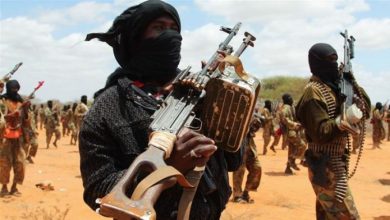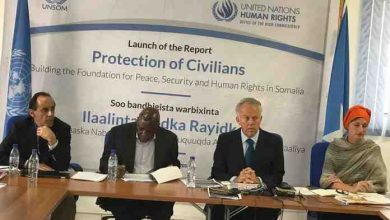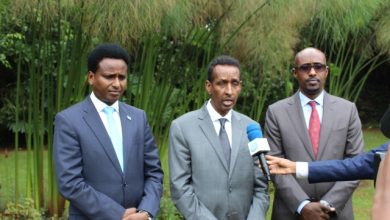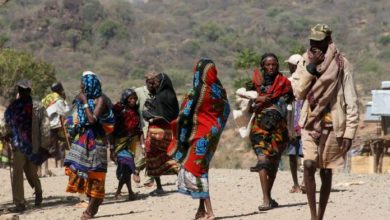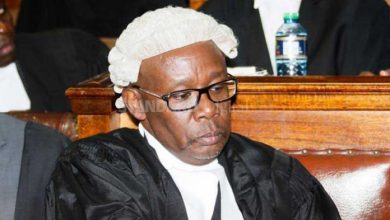‘This Creates Fear’: Trump Rally Turns Spotlight on Minnesota’s Somali Community
At a suburban supermarket a few days ago, Warda Abdi, a Somali-American, was approached by a white woman she had never met, who said: “We love you guys. We want you to be here.” A far different message was left on Friday on the voice mail of Mukhtar M. Ibrahim, a journalist in Minnesota who was born in Somalia: “Go back to where you came from,” the caller said, ending the message with a racial slur.
At a suburban supermarket a few days ago, Warda Abdi, a Somali-American, was approached by a white woman she had never met, who said: “We love you guys. We want you to be here.” A far different message was left on Friday on the voice mail of Mukhtar M. Ibrahim, a journalist in Minnesota who was born in Somalia: “Go back to where you came from,” the caller said, ending the message with a racial slur.
It has been nearly a week since President Trump visited Minneapolis for a campaign rally. There, the president boasted to thousands of cheering supporters about curbing the flow of refugees into the country, and labeled Representative Ilhan Omar, a Somali refugee, “a disgrace.” When he described how Somalis had previously come to Minnesota in large numbers, some in the crowd booed.
Protesters and supporters who traded angry taunts outside the rally have long since gone home, and the arena has gone back to hosting basketball. Still, the president’s rhetoric about this city’s large Somali-American population has lingered, bringing forth new displays of compassion but also of hostility.
“This creates tension, this creates fear, this creates anxiety for many people,” said Mohamud Noor, a Democratic member of the Minnesota House of Representatives who was born in Somalia. The president, Mr. Noor added, had signaled to his supporters that “now it’s O.K. to discriminate against Somalis.”
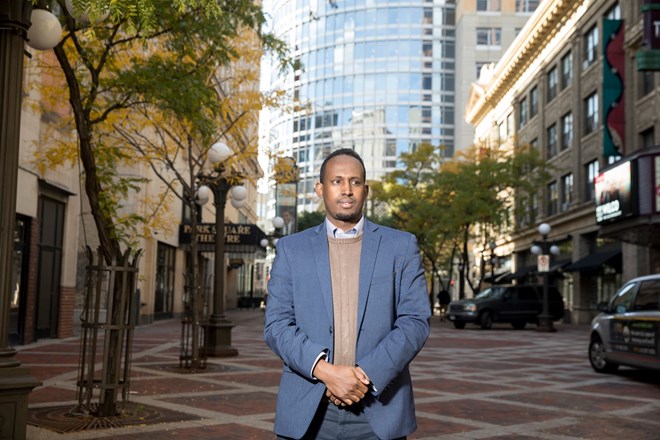
Mukhtar M. Ibrahim, editor and executive director of Sahan Journal, a nonprofit publication that covers immigrants and refugees in Minnesota, said he called the F.B.I. to report an angry voice mail he received.CreditJenn Ackerman for The New York Times
Mr. Trump’s speech in Minneapolis, a liberal stronghold in a politically mixed state, thrust the region’s tens of thousands of Somali residents into an unwanted national spotlight.
“For the president of the United States, the most powerful man in the world, to single you out as dangerous hurts,” said Abdisalam Adam, an assistant principal in nearby St. Paul who said he got phone calls on the night of the rally from frustrated fellow Somali-Americans. In the days since, he said, he has urged friends to go out in groups and to report any incidents of harassment to the authorities.
Mr. Trump had spoken critically of members of Minnesota’s Somali community before, including on the eve of the 2016 election, when he called them a “disaster.” After narrowly losing the state of Minnesota that year, Mr. Trump has said that he sees an opportunity to flip the state in 2020, and he has suggested that Ms. Omar’s new prominence can help him accomplish that.
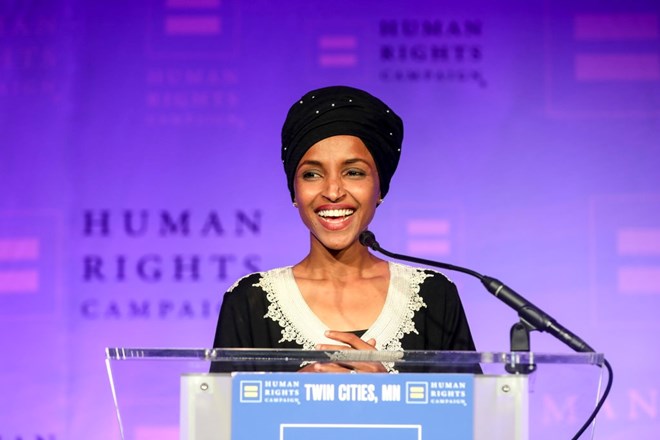
Representative Ilhan Omar at a dinner for the Human Rights Campaign on Saturday.CreditJenn Ackerman/Associated Press Images for The Human Rights Campaign
Jennifer Carnahan, the chairwoman of the Minnesota Republican Party, said she believed that Mr. Trump’s remarks at the rally had been sensationalized and taken out of context. Ms. Carnahan said it was fair game for the president and the crowd to voice their distaste for Ms. Omar, who during her short tenure in Congress has become a hero of the progressive left but has also made remarks that many consider anti-Semitic.
“Our party and the people that support the president get a really unfair and bad rap sometimes,” Ms. Carnahan said, adding, “Our party is not against Somalis.”
Ms. Carnahan and other Republicans also defended the president’s policy of placing refugees in a city only after consulting with local officials. On Twitter, Paul Gazelka, a Republican state senator, pointed to longstanding tensions over resettlement in St. Cloud, an hour’s drive from Minneapolis, and said “that may be why some booed” at the mention of Somalis.
MN has taken in many refugees over the last 30 years.And refugee resettlement has not always gone smoothly,like St. Cloud. That may be why some booed last night.Trump offered more local control.That is a solution that works. GOP SUPPORTS LEGAL Immigration.
“Trump offered more local control,” Mr. Gazelka wrote. “That is a solution that works.”
For his part, Jacob Frey, the mayor of Minneapolis, signed a proclamation on the night of the president’s speech, declaring it “Love Trumps Hate Day.” Mr. Frey said he would gladly take more refugees.
“We welcome them,” he said. “In fact, we need them.”
Consent given. Immigrants and refugees are welcome in Minneapolis. https://twitter.com/cattyjargon/status/1182475522984398848 …
Cheeky CJ@CattyJargonTrump: No refugees will be placed in any city or state without the explicit consent of your governor or mayor. So ask your mayor about that.
Somali refugees began arriving in significant numbers in Minnesota in the early 1990s after fleeing war in their homeland. The community quickly grew, with a steady stream of new arrivals and American-born children.
Tensions have emerged over the years, and the Somali community has been targeted at times. In 2017, white supremacists bombed a mosque in suburban Bloomington. A few weeks ago, the Minneapolis police arrested a man on suspicion of vandalizing Somali-owned businesses. Prosecutors filed bias crime charges and said the man had expressed a hatred of Somalis.
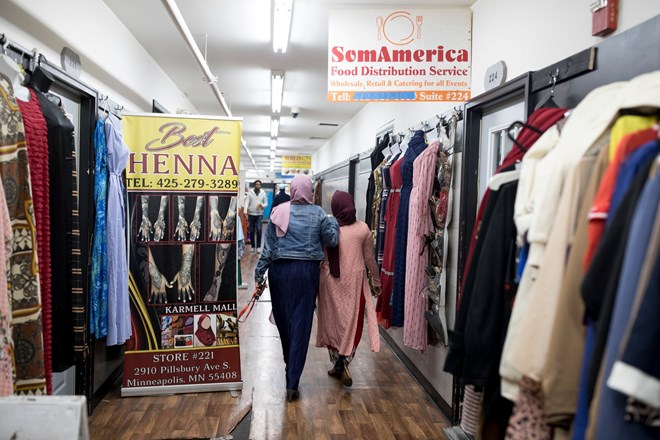
Women shopping at the Karmel Mall in Minneapolis.CreditJenn Ackerman for The New York Times
But mostly, Somali-Americans said this week in a series of interviews, Minnesota has felt like home.
At a Roman Catholic church about three miles from where Mr. Trump spoke, a priest took time during Sunday Mass to speak against xenophobia.
“Think of the people that are so excluded and put down, like Somalis, Muslims,” the Rev. Jerry Stookey told his parishioners. “But that’s not the way of the Lord. We’re all in this together.”
After praying on Sunday at a mosque in Minneapolis, Ms. Abdi said she remained in disbelief at the comments of the president, who she said was “talking like a child” at his rally. But she also recalled how a stranger approached her at the grocery after that rally, offering a hug and words of support.
“We are glad that people in Minnesota are better than him,” Ms. Abdi said.
Still, some people said they had grown more vigilant and more aware of their surroundings since Mr. Trump’s remarks. Mr. Ibrahim, the editor and executive director of Sahan Journal, a nonprofit publication that covers immigrants and refugees in Minnesota, said he reported the angry voice mail that he received on Friday to the F.B.I.
Mr. Ibrahim said he believed that the caller may have targeted him because of an article he wrote after the rally about Somali-Americans pledging to vote against Mr. Trump. He found the call alarming. He added, “I think it’s someone who doesn’t like my presence here and someone who could potentially now carry out the violence if he has the means.”




